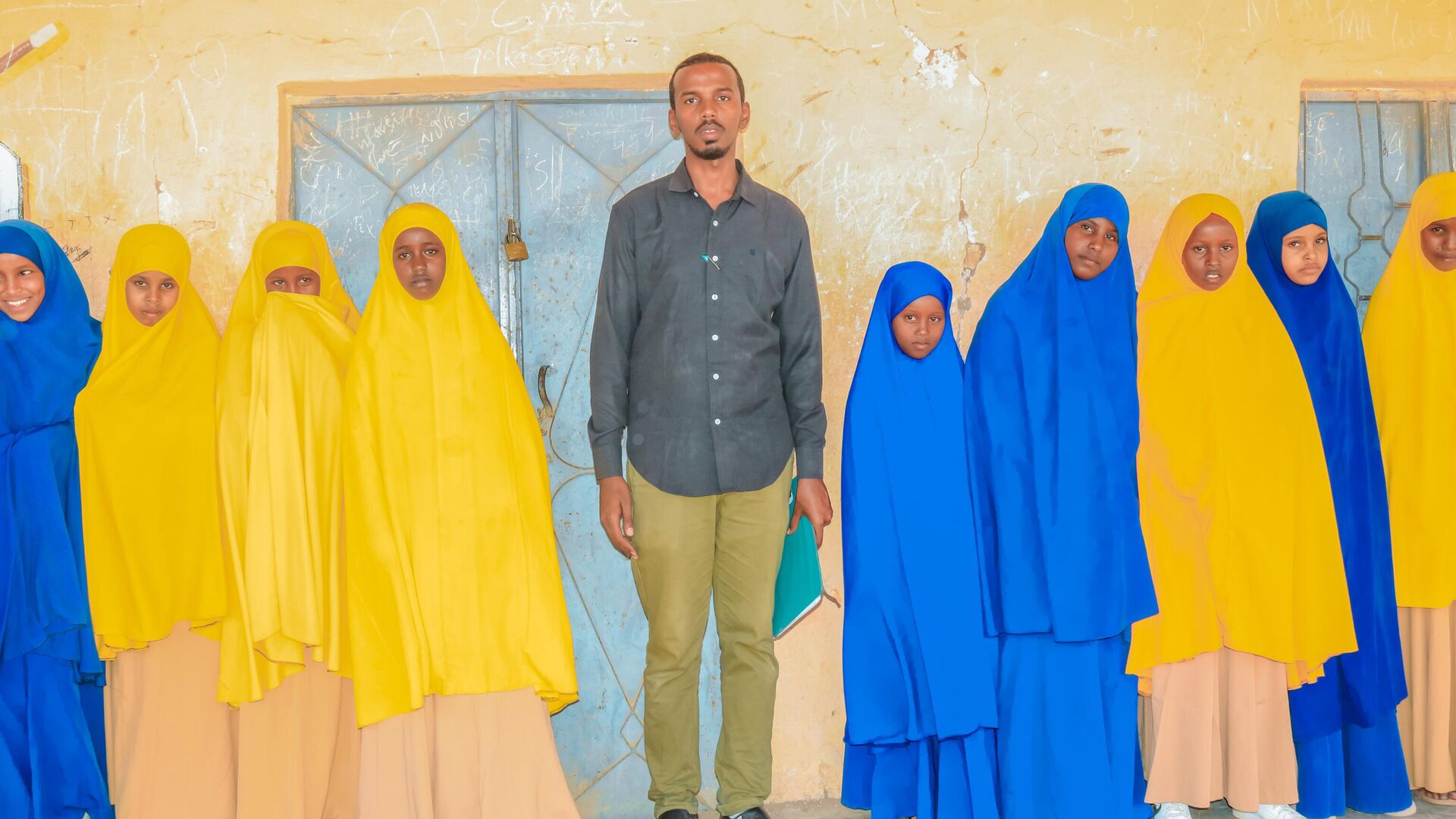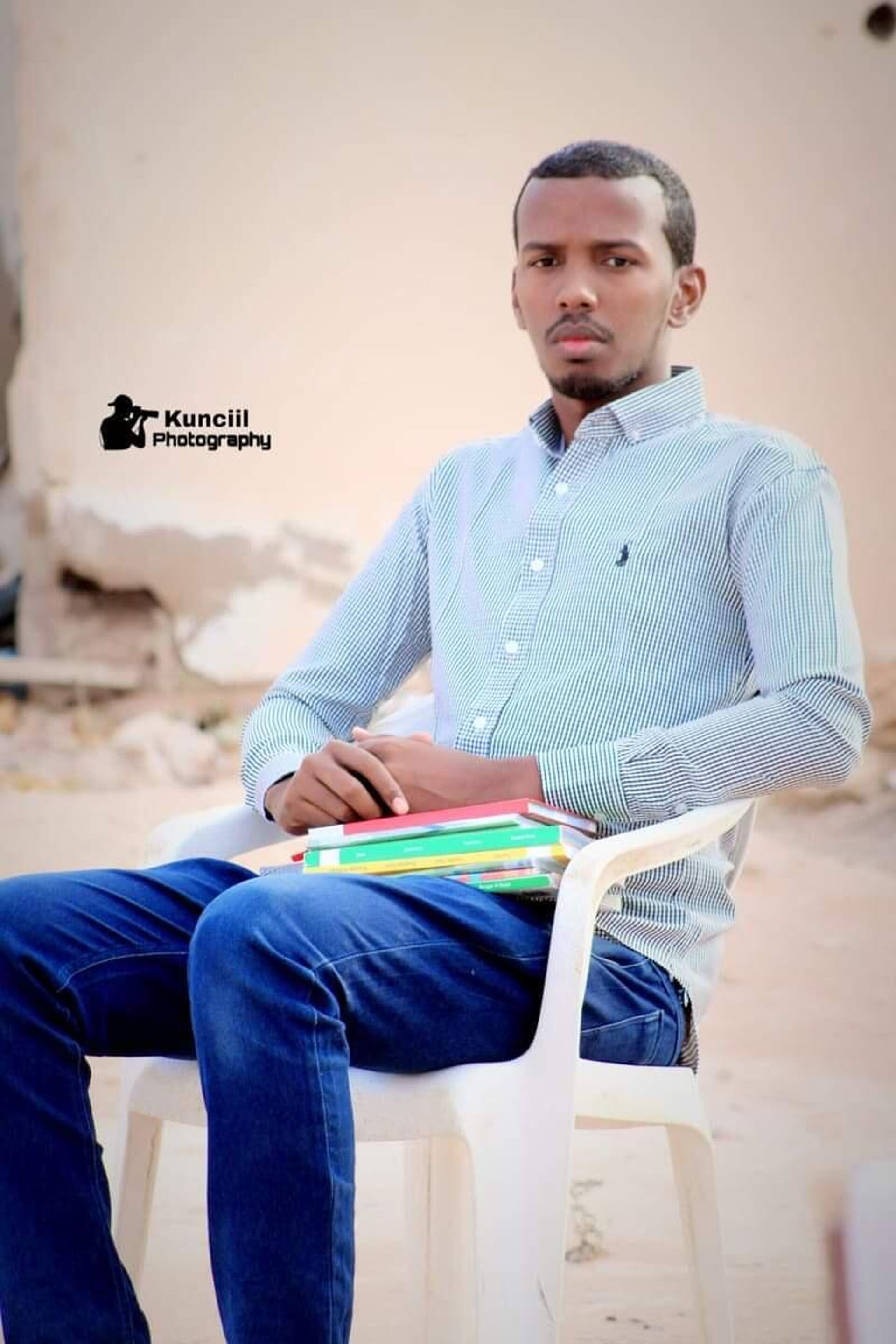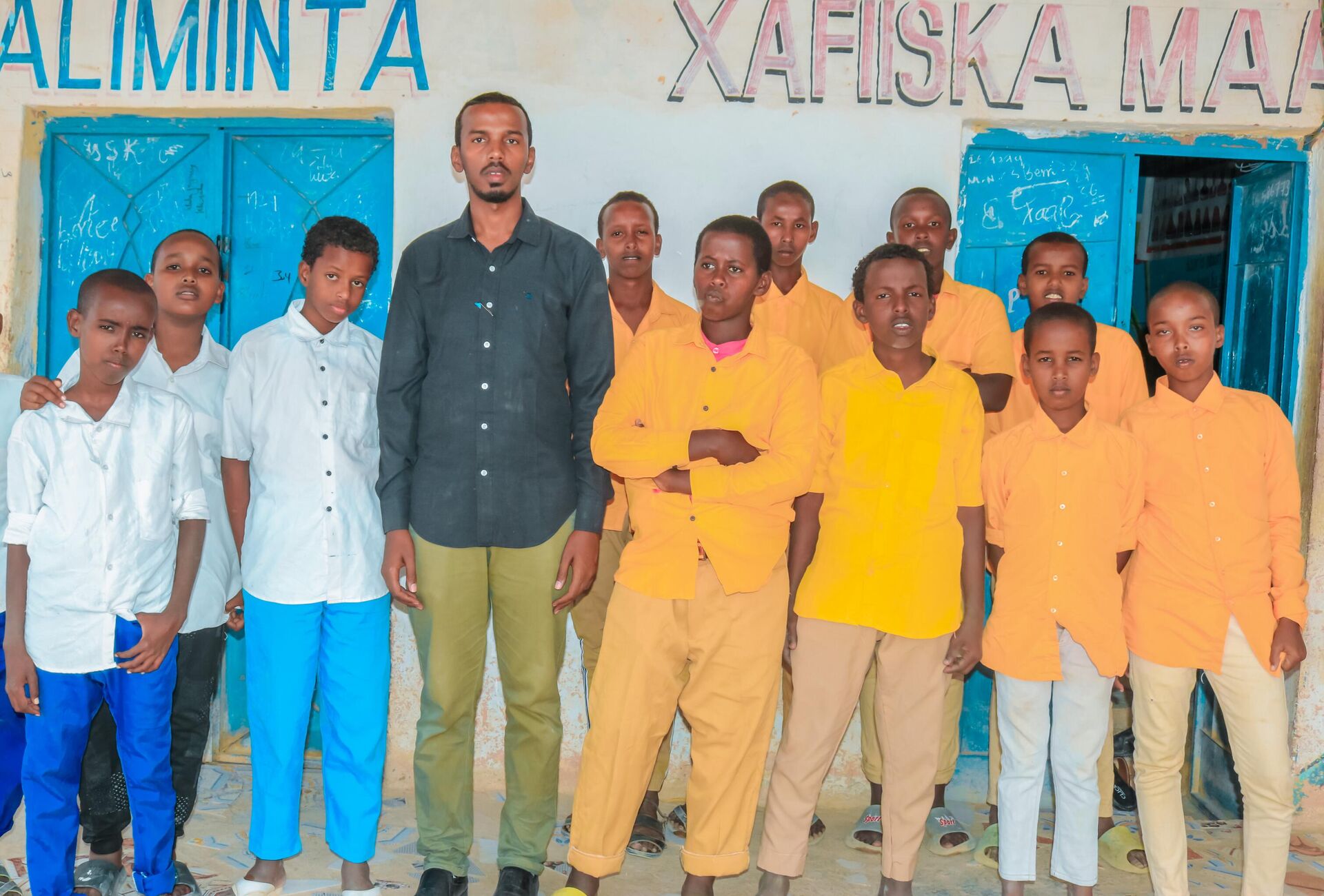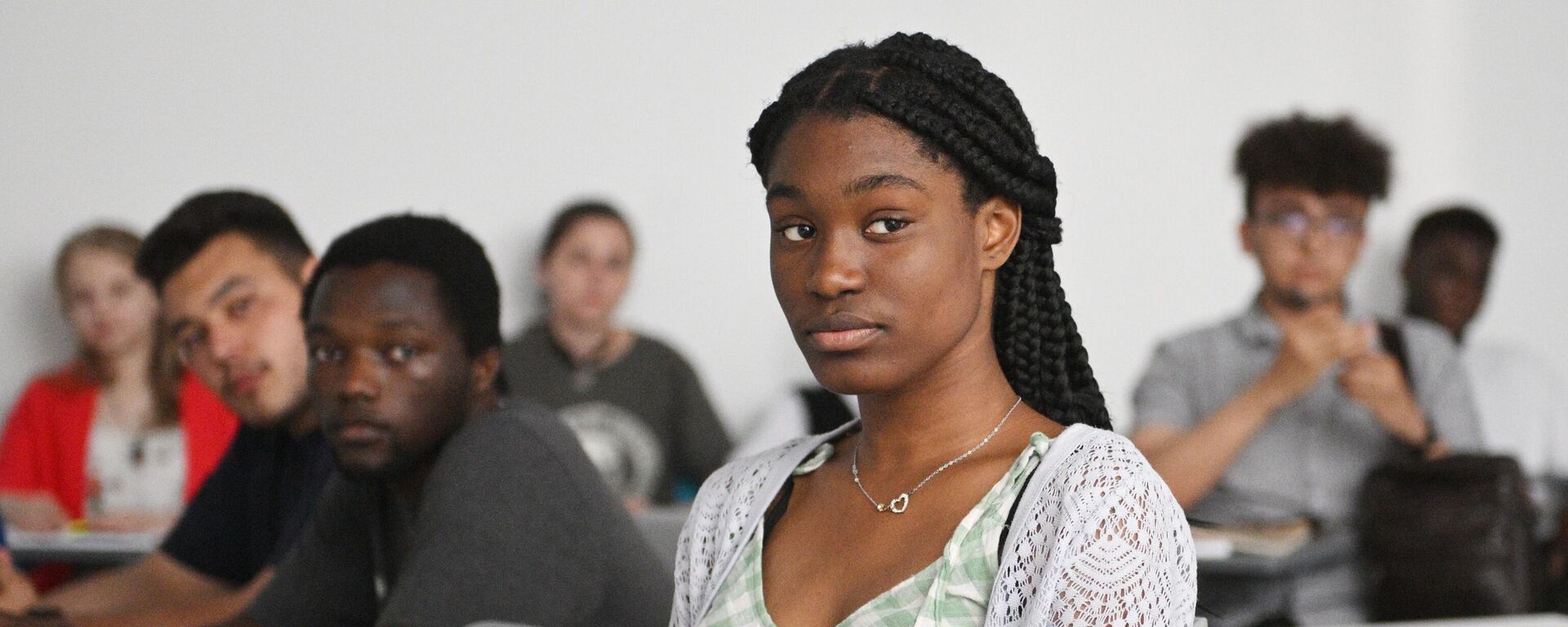https://en.sputniknews.africa/20230908/teacher-from-war-torn-somalia-shares-his-story-on-international-literacy-day-1061921871.html
Teacher From War-Torn Somalia Shares His Story on International Literacy Day
Teacher From War-Torn Somalia Shares His Story on International Literacy Day
Sputnik Africa
The world celebrates Literacy Day on Friday. Sputnik Africa presents the inspiring story of a Somalian teacher Rufai Mohamud Hussein, who in an atmosphere of... 08.09.2023, Sputnik Africa
2023-09-08T10:07+0200
2023-09-08T10:07+0200
2023-09-08T11:20+0200
somalia
east africa
africa in details
opinion
education
children
international literacy day
terrorism
ethiopia
al-shabaab
https://cdn1.img.sputniknews.africa/img/07e7/09/06/1061923765_0:160:3072:1888_1920x0_80_0_0_02b4077668442d26b471ce5a4c597934.jpg
Mohamud Hussein's childhood was rough. At an early age he sensed the violence in the capital, Mogadishu. In 2006, at the height of the civil war, he lost his father, who was killed by Ethiopian armed militias in the same city.In 2006, radical Islamist groups the Islamic Courts Union and the al-Qaeda*-linked al-Shabaab* seized Mogadishu, forcing Somalia's transitional authorities to seek help from neighboring Ethiopia. A year later, the militants were driven out of the capital by joint Ethiopian and government forces, but al-Shabaab has not stopped its terrorist activities, jeopardizing the daily lives and stability of Somalis today.As the Somalian previously said, he was "born into a life dictated by civil strife" and was exposed to bloody scenes "at a tender age." In fact, it was not only God who helped him in this endeavor, Mohamud himself put in the effort and walked purposefully towards his goal. He completed high school and university in Galmudug state and then enrolled at SIMAD University in the capital, where he earned a bachelor's degree in mathematics.The education paved the way for his professional career in teaching children, something he has been doing for ten years now and relishes.The teacher's educational methodology focuses on teaching children to read, write and think, through so they "develop the ability to read complex text in the Somali language or English."At the Imam-Malik primary school, where he is also the deputy principal, he pays attention to the discipline of students, with the principal strictly monitoring their attendance and calling parents of truant students to clarify the reasons for their absence. The teacher added that his students come from the Adado town and its surroundings.Education in SomaliaSpeaking about the challenges facing modern Somalia in the field of education, the teacher noted that they include shortages of supplies and staff.However, he noted that the teaching profession has recently become increasingly competitive, popular and in demand among Somalis. In addition, the government has launched special colleges for teacher training.International Literacy Day was established in 1966 after an Iranian conference on the eradication of illiteracy. Since 1967, this international day has been celebrated annually to remind the public of the importance of literacy within the context of human dignity and human rights, and to galvanize efforts to build more literate and sustainable societies.As of 2023, 750 million adults still lack basic reading and writing skills, according to the World Literacy Foundation, a global nonprofit organization focusing on improving literacy rates. The foundation added that about 258 million children and youth are out of school.*Al-Qaeda and al-Shabaab are terrorist groups banned in Russia and many other countries
https://en.sputniknews.africa/20230901/from-algeria-to-e-guinea-african-students-share-experiences-of-studying-in-russia-on-knowledge-day-1061794443.html
somalia
east africa
ethiopia
Sputnik Africa
feedback@sputniknews.com
+74956456601
MIA „Rossiya Segodnya“
2023
Maxim Grishenkin
https://cdn1.img.sputniknews.africa/img/07e7/0a/17/1063018107_0:0:1104:1103_100x100_80_0_0_03090c85a11f5d2e8a19cf1d989443c9.jpg
Maxim Grishenkin
https://cdn1.img.sputniknews.africa/img/07e7/0a/17/1063018107_0:0:1104:1103_100x100_80_0_0_03090c85a11f5d2e8a19cf1d989443c9.jpg
News
en_EN
Sputnik Africa
feedback@sputniknews.com
+74956456601
MIA „Rossiya Segodnya“
Sputnik Africa
feedback@sputniknews.com
+74956456601
MIA „Rossiya Segodnya“
Maxim Grishenkin
https://cdn1.img.sputniknews.africa/img/07e7/0a/17/1063018107_0:0:1104:1103_100x100_80_0_0_03090c85a11f5d2e8a19cf1d989443c9.jpg
somalia, east africa, africa in details, education, children, international literacy day, terrorism, ethiopia, al-shabaab
somalia, east africa, africa in details, education, children, international literacy day, terrorism, ethiopia, al-shabaab
Teacher From War-Torn Somalia Shares His Story on International Literacy Day
10:07 08.09.2023 (Updated: 11:20 08.09.2023) The world celebrates Literacy Day on Friday. Sputnik Africa presents the inspiring story of a Somalian teacher Rufai Mohamud Hussein, who in an atmosphere of violence and lack of peaceful skies above his head found the strength not to flee his homeland, but to enlighten local children and eliminate illiteracy for the brighter future.
Mohamud Hussein's childhood was rough. At an early age he sensed the violence in the capital, Mogadishu. In 2006, at the height of the civil war, he lost his father, who was killed by Ethiopian armed militias in the same city.
"My mother became the breadwinner of my family comprising 10 children. Due to heavy fighting in Mogadishu in 2006 between government forces allied with Ethiopian forces and clan militias we shifted to Adado district in Galmudug state [central Somalia]," Mohamud Hussein told Sputnik Africa in an interview.
In 2006, radical Islamist groups the Islamic Courts Union and the al-Qaeda*-linked al-Shabaab* seized Mogadishu, forcing Somalia's transitional authorities to seek help from neighboring Ethiopia. A year later, the militants
were driven out of the capital by joint Ethiopian and government forces, but al-Shabaab has not stopped its terrorist activities, jeopardizing the daily lives and stability of Somalis today.
As the Somalian previously said, he was "born into a life dictated by civil strife" and was exposed to bloody scenes "at a tender age."
It was at this point that Mohamud discovered a passion for teaching and as he told Sputnik Africa, "God made his dream become true."
In fact, it was not only God who helped him in this endeavor, Mohamud himself put in the effort and walked purposefully towards his goal. He
completed high school and university in Galmudug state and then enrolled at SIMAD University in the capital, where he earned a bachelor's degree in mathematics.
The education paved the way for his professional career in teaching children, something he has been doing for ten years now and relishes.
"When I am in class I really enjoy teaching young children, I cope very well with the harsh environment in my country and can adapt my teaching method," Hussein remarked.
The teacher's educational methodology
focuses on teaching children to read, write and think, through so they "develop the ability to read complex text in the Somali language or English."
At the Imam-Malik primary school, where he is also the deputy principal, he pays attention to the discipline of students, with the principal strictly monitoring their attendance and calling parents of truant students to clarify the reasons for their absence. The teacher added that his students come from the Adado town and its surroundings.
Speaking about the challenges facing modern Somalia in the field of education, the teacher noted that they include shortages of supplies and staff.
"By and large most of our schools in Somalia share the same challenges which include lack of enough classrooms, teaching aid materials and lack of enough trained teachers," Mohamud remarked.
However, he noted that the
teaching profession has recently become increasingly competitive, popular and in demand among Somalis. In addition, the government has launched special colleges for teacher training.
"The federal government in hand with regional governments have established teaching colleges to train teachers and that also made more students enroll in teaching colleges which will run for two years," Mohamud concluded.
International Literacy Day was established in 1966 after an Iranian conference on the eradication of illiteracy.
Since 1967, this international day
has been celebrated annually to remind the public of the importance of literacy within the context of human dignity and human rights, and to galvanize efforts to build more literate and sustainable societies.
UNESCO celebrates the holiday on Friday under the theme "Promoting literacy for a world in transition: Building the foundation for sustainable and peaceful societies."
As of 2023, 750 million adults still lack basic reading and writing skills, according to the World Literacy Foundation, a global nonprofit organization focusing on improving literacy rates. The foundation added that about 258 million children and youth are out of school.
*Al-Qaeda and al-Shabaab are terrorist groups banned in Russia and many other countries





